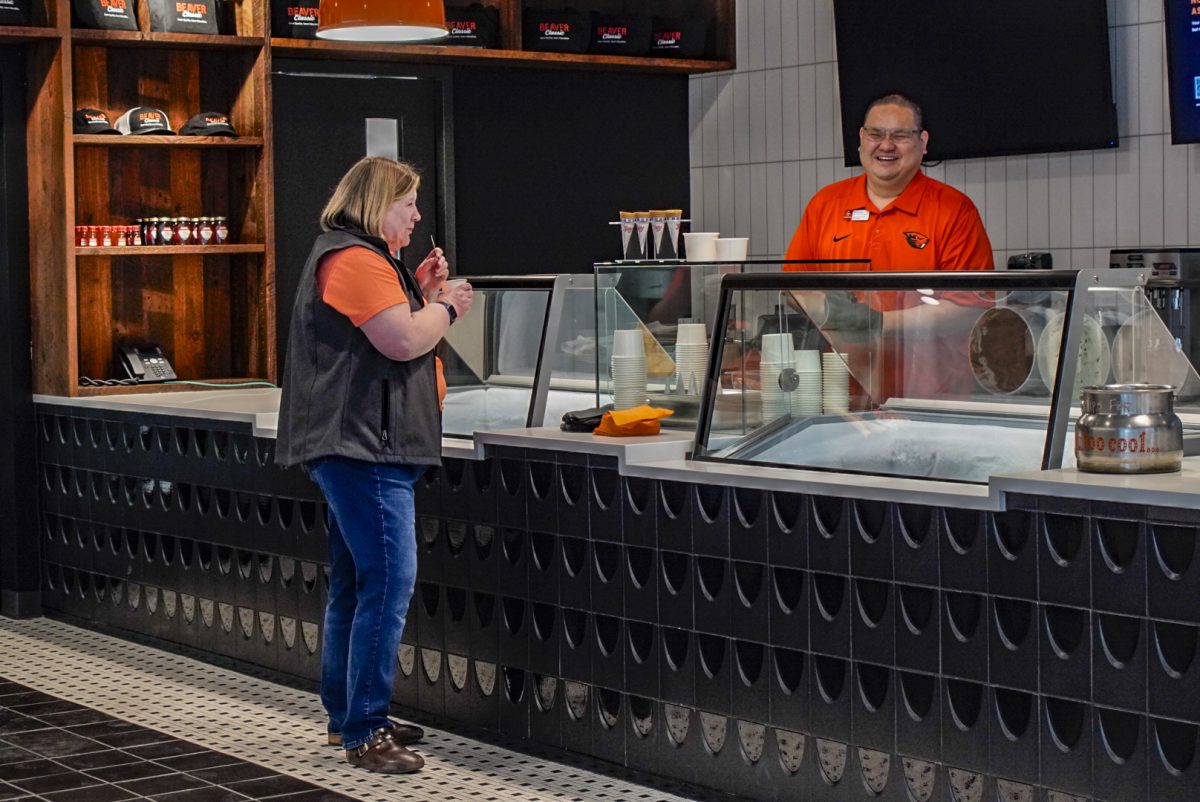While Oregon State University has made efforts to improve sustainability, a number of vegan and vegetarian students feel their food choices are cut short with limited, high-cost options.
A main appeal with veganism is sustainability. According to the Intergovernmental Panel on Climate Change, compared to the existing dietary patterns in the majority of industrialized countries, a switch to plant-based diets rich in nuts, fruits and vegetables might result in a significant reduction of greenhouse gas emissions.
The 1987, United Nations Brundtland Commission defined sustainability as “meeting the needs of the present without compromising the ability of future generations to meet their own needs.”
A huge part of sustainability is tied to food and food waste, and OSU’s sustainability mission involves preventing unnecessary food waste and supplying their kitchens with organic, locally grown food products, according to the University Housing and Dining website.
OSU has three main dining halls, plus the Memorial Union and the coffee shops around campus. According to UHDS, each dining hall has vegan options and they can remove the animal product and replace it with a plant-based protein.
A Barometer survey of students asked how respondents felt about vegan options on campus, including questions such as “How do you feel about how these options are being prepared?”, “Are they cooked enough for you?” and “Do they taste good?”
Autumn Childs, another student said, “I definitely feel like there should be more plant-based options on campus. I feel like if there’s potential to have five or more meat options, there should be at least more than one plant-based option.”
Alongside these questions were a few more asking about their thoughts on the prices and if they thought there was enough variety in plant-based options.
“Very limited. I can only eat black bean burgers and salads so many times,” said Arianna Ojeda, a student from the survey.
The survey itself ended up getting 54 responses. Out of the students taking the survey, 21 of them are vegan or vegetarian, while the other 33 participants were either not plant-based or considering a switch to a plant-based diet. When asked if they liked the plant-based options 58% of students stated they do not always enjoy the current options.
“I would say that Ring of Fire (Marketplace West) and Nori (Arnold Dining) are the only places on campus that actually prepare their plant-based foods properly. Every other place seems to be serving raw, uncooked soy products with little to no seasoning,” Childs said.
Twenty-seven of the students believe that the plant-based options should be cheaper due to either the limited options or because they thought that plant-based products are usually cheaper to produce than meat products.
At the OSU dining halls the prices for the plant-based protein are usually the same amount as the meat protein. A meal at Calabaloos at McNary is $7.25 for a build your own burger, to add non-dairy cheese it is an extra $1.25 making an entirely plant-based burger $8.45.
At Serrano’s grill in West, a bean & rice bowl is $7.25, even if you get meat or just vegetables. Cascadia Market has an Orange Ginger Tofu Bowl for $8.00, which is the same amount as the chicken or shrimp bowl.
About the cost of plant-based options, Weston Reid, a student from the survey said, “Frustrated, as plant options are almost always less expensive for industries who buy the produce and goods.”
One of these students, Milo Tisdale, a botany major who follows a vegan diet, expanded on his answers.
“I would say dislike is the wrong word, I have to give credit where credit is due, there is a wide variety of plant-based options, especially compared to other schools, but I do think they could be better,” Tisdale said.
Tisdale cited a study by the International Aid for the Protection and Welfare of Animals, it is important to acknowledge the environmental impact the production of animal products causes, including high levels of greenhouse gas emissions, mass deforestation, extreme water use and water pollution.
While Tisdale has a few issues with the plant-based options on-campus, he acknowledges that some amount of slack is needed when it comes to feeding a large volume of students. He knows it will not be perfect every time, but said he wishes that the plant-based options got the same amount of diligence when being prepared as the meat options.
“There are places on campus where they are good at mixing up their options, Ring of Fire is one example, the soy curls are a good one, I think the campus could even have more beans, like a nice bean soup,” Tisdale said “I just want to see them varying up the options, (it) seems like most of the places I go to on an average day, the option will be an uncooked, unseasoned piece of tofu.”




















































































![Newspaper clipping from February 25, 1970 in the Daily Barometer showing an article written by Bob Allen, past Barometer Editor. This article was written to spotlight both the student body’s lack of participation with student government at the time in conjunction with their class representatives response. [It’s important to note ASOSU was not structured identically to today’s standards, likely having a president on behalf of each class work together as one entity as opposed to one president representing all classes.]](https://dailybaro.orangemedianetwork.com/wp-content/uploads/2025/03/Screenshot-2025-03-12-1.00.42-PM-e1741811160853.png)


























